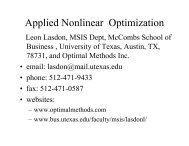[PDF] ALIO Back Matter
[PDF] ALIO Back Matter
[PDF] ALIO Back Matter
You also want an ePaper? Increase the reach of your titles
YUMPU automatically turns print PDFs into web optimized ePapers that Google loves.
SB08<br />
3 - Robust Buffer Allocation for Scheduling of a Project with<br />
Predefined Milestones<br />
Piotr Lebkowski, Professor, AGH University of Science and<br />
Technology, Mickiewicza 30, Krakow, 30-059, Poland,<br />
kamienicxka@poczta.fm<br />
The paper discusses the problem of robust buffer allocation for Resource-<br />
Constrained Project Scheduling Problem with predefined milestones, for which<br />
execution deadlines have been established. To solve the problem, an algorithm is<br />
proposed supporting insertion of unit time buffers, with the simultaneous<br />
maximisation of new metrics of arrangement robustness. The presented results of<br />
experimental research speak for usability of the solutions proposed.<br />
4 - Simulation Model using the Transformed Inverse Function Applied<br />
to Flowshop Production to Minimize the Sampling Costs, under the<br />
Bayesian Revision and Markovian Processes Approach<br />
Rodrigo Barbosa, PhD, Universidad Del Norte, Km. 5 vía a Puerto<br />
Colombia, Barranquilla, Colombia, rbarbosa@uninorte.edu.co<br />
Uncertainty is present in every department of analysis and statistical control, where<br />
the inspector’s decision is not always the correct one. This investigation is based on<br />
the study of CSP sampling plans for acceptance in series and by lots, where a<br />
simulation model that uses the transformed inverse function has been designed to<br />
this problem, under the Bayesian revision and Markovian process approach, where<br />
sampling costs are minimized.<br />
5 - Optimal Warm-up Periods When Simulating Queues<br />
Winfried Grassmann, Professor Emeritus, University of<br />
Saskatchewan, 110 Science Place, Department of Comuter Science,<br />
Saskatoon, SK, S7N 5C9, Canada, grassman@cs.usask.ca<br />
We investigate-by methods derived from uniformization-the optimal choice of the<br />
initial state and the optimal length of warm-up periods when simulating queueing<br />
systems. In tandem queues, the optimal warm-up period is typically reached once<br />
the first job has passed through the system.<br />
■ SB08<br />
Aula 355- Third Floor<br />
Oil Field Exploration and Development<br />
Sponsor: Decision Analysis<br />
Sponsored Session<br />
Chair: Canan Ulu, University of Texas, IROM, B6500,<br />
1 University Station, Austin, TX, 78712, United States of America,<br />
canan.ulu@mccombs.utexas.edu<br />
1 - Multivariate Real Options Valuation<br />
Jim Dyer, University of Texas, Austin, TX, 78712, United States of<br />
America, Jim.Dyer@mccombs.utexas.edu, Tianyang Wang<br />
We have explored two approaches for solving a multi-factor real options problem by<br />
approximating the underlying stochastic process for project value with (1) an<br />
implied binomial tree and (2) a decision tree representation of the correlated cash<br />
flows.<br />
2 - A Constraint Programming Approach to the Problem<br />
of Oil Well Drilling Scheduling with Resource Displacement and<br />
Inventory Management<br />
Thiago Serra, Universidade de São Paulo, Rua do Matao, 1010,<br />
São Paulo, Brazil, tserra@ime.usp.br, Gilberto Nishioka,<br />
Fernando Marcellino<br />
So far, scheduling scarce resources for oil well drilling focused mainly on make-span<br />
minimization targeting compatibility of activities and precedence constraints; and a<br />
last approach included resource displacement. It is proposed a new model with<br />
deeper analysis on compatibility issues, productivity maximization and lines<br />
transportation. Despite previous criticism, constraint programming is used for being<br />
easy to prototype and also due to late performance improvements in state-of-art<br />
solvers.<br />
3 - Portfolio Selection Through Simulation in a Maritime Terminal which<br />
Supplies Oil for Four Refineries in Brazil<br />
Claudio Limoeiro, Petrobras, Av. Nilo Peçanha,<br />
151 - 7o andar, Centro, Rio de Janeiro, RJ, 20020-100, Brazil,<br />
claudiolimoeiro@petrobras.com.br, Daniel Barry Fuller,<br />
Eliahu Rosenbaum, Barbara Miranda<br />
The study consisted of experimenting with simulation in order to foresee<br />
operational bottlenecks and support the analysis of possible investments in tanks,<br />
pipelines and piers which were expected to improve both regional logistics and<br />
product quality. The fundamental goals considered were to supply all refineries fully<br />
and in a balanced manner while minimizing the impact in the other operations of<br />
the terminal which did not contribute to the refinery supplying, such as<br />
transshipment.<br />
<strong>ALIO</strong> / INFORMS International – 2010<br />
30<br />
■ SB09<br />
Aula 356- Third Floor<br />
Applied Probability<br />
Contributed Session<br />
Chair: Eugene Feinberg, Professor, Stony Brook University,<br />
Department of Applied Mathematics, Stony Brook, NY, 11794-3600,<br />
United States of America, eugene.feinberg@sunysb.edu<br />
1 - Vulnerability of Disasters in Central America<br />
Margarita Villagran de Leon, Vulnerability of Desastres in Central<br />
America, Professor, University San Carlos, 9 Avenida 9-45 zona<br />
11,Cum USAC, Faculty of Medicine, San Carlos Univ Z12,<br />
Guatemala., 01011, Guatemala, margavilla2008@hotmail.com<br />
Vulnerability,Seismic Hazard,Risk concepts are associated to Disasters. Seismic<br />
Hazard Maps,Geological faults,Volcanic Chain are to earthquakes. Seismic Statistics<br />
magnitudes, epicenter are important to develop Early Alert Systems. We use simple<br />
Poisson probabilistic prediction for earthquakes. Optimization, Logistics for Resource<br />
distribution allocation,learning Emergency Plan Lessons to rescue lives and obtain<br />
funds are a goal.<br />
2 - Markov Modulated Brownian Motion with Application to Fluid<br />
Queues in Random Environment<br />
Bernardo D’Auria, Visiting Professor, Universidad Carlos III<br />
de Madrid, Avda Universidad, 30, Leganes, 28911, Spain,<br />
bernardo.dauria@uc3m.es, Offer Kella<br />
We present the analysis of a two-sided regulated Brownian motion whose<br />
parameters together with the levels of the two reflecting barriers depend on an<br />
external Markovian random environment. The process is interesting both from the<br />
theoretical point of view and for its direct application to Brownian queues with<br />
modulated buffer size. For this process we show how to compute the stationary<br />
distribution and present some simple examples for the case of a fluid queue in a<br />
two-state environment.<br />
3 - Stochastic Stability and Control for Continuous-time Markovian<br />
Jumps Linear Systems Associated with a Finite Number of<br />
Jump Times<br />
Cristiane Nespoli, UNESP - Universidade Estadual Júlio de Mesquita<br />
Filho, Rua Roberto Simonsen 305, Presidente Prudente, 19060900,<br />
Brazil, cnespoli@fct.unesp.br, Y.R.Z Cáceres, J.B.R. do Val<br />
This work deals with the stochastic stability and optimal control involving<br />
continuous-time MJLS. The horizon of the problem is defined by the occurrence of<br />
a finite number of jumps. Based on the concept of T-stability, an optimal solution<br />
for the problem with complete Markov states observation, and a sub-optimal<br />
solution for the problem with incomplete state observation, both based on linear<br />
matrix inequalities, are presented.<br />
4 - Optimality of Trunk Reservation in an M/M/k/N Queue with Several<br />
Types of Customers and Holding Costs<br />
Eugene Feinberg, Professor, Stony Brook University, Department of<br />
Applied Mathematics, Stony Brook, NY, 11794-3600, United States<br />
of America, eugene.feinberg@sunysb.edu, Fenghsu Yang<br />
We study optimal admission to an M/M/k/N queue with several customer types.<br />
The cost structure consists of revenues collected from admitted customers and<br />
holding costs, both of which depend on customer types. The goal is to find an<br />
admission policy that minimizes average rewards per unit time. Under natural<br />
assumptions we show that an optimal policy has a trunk reservation form.<br />
Previously problems with the same holding costs for all customers have been<br />
studied in the literature.<br />
■ SB10<br />
Aula 357- Third Floor<br />
Applications of Game Theory in Decision Making<br />
Sponsor: INFORMS Computing Society<br />
Sponsored Session<br />
Chair: Bo Chen, Professor, University of Warwick, Warwick Business<br />
School, Gillbet Hill Road, Coventry, CV4 7AL, United Kingdom,<br />
B.Chen@warwick.ac.uk<br />
1 - Resource Allocation Games of Various Social Objectives<br />
Bo Chen, Professor, University of Warwick, Warwick Business<br />
School, Gillbet Hill Road, Coventry, CV4 7AL, United Kingdom,<br />
B.Chen@warwick.ac.uk, Sinan Gurel<br />
We study resource allocation games of two different cost components for individual<br />
game players and various social costs. The total cost of each individual player<br />
consists of the congestion cost and resource activation cost. The social costs we<br />
consider are, respectively, the total of costs of all players and the maximum<br />
congestion cost plus total resource activation cost. We assess the quality of Nash<br />
equilibria in terms of the price of anarchy and the price of stability.


![[PDF] ALIO Back Matter](https://img.yumpu.com/17932960/10/500x640/pdf-alio-back-matter.jpg)
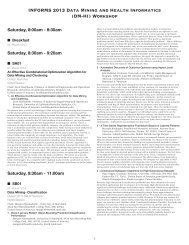
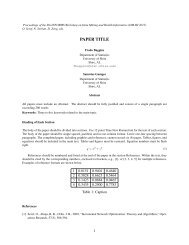
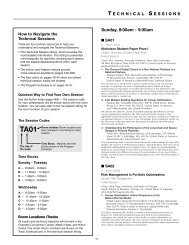
![[PDF] Charlotte Back Matter](https://img.yumpu.com/17933057/1/190x245/pdf-charlotte-back-matter.jpg?quality=85)
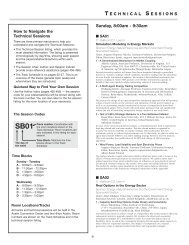
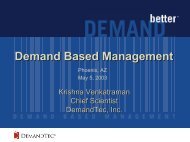
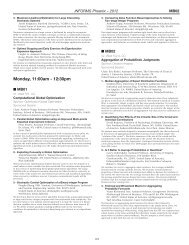
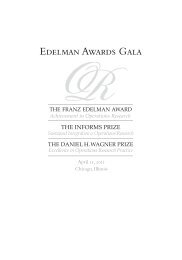
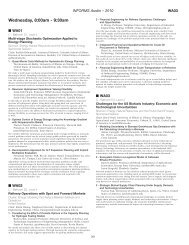
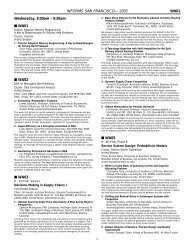
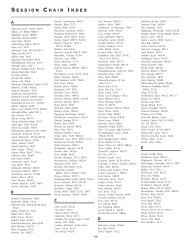
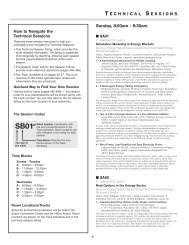
![[PDF] Monday, 8:00am - 9:30am](https://img.yumpu.com/17932954/1/190x245/pdf-monday-800am-930am.jpg?quality=85)
